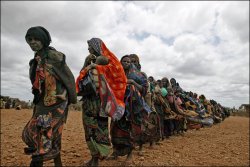Underreported Humanitarian Stories of 2005
Here's an uplifting way to spend a Saturday afternoon. Check out Doctors Without Borders' top 10 most underreported humanitarian stories of 2005.

Congolese Ravaged by War and Disease
The extreme deprivation and violence endured by millions of Congolese goes virtually unnoticed to the rest of the world. Since mid-November, renewed fighting between the Congolese Army (FARDC) and the Mai-Mai rebels has caused the displacement of tens of thousands of people throughout Katanga province, in southeast Democratic Republic of Congo (DRC).
Staggering Needs, Insecurity, and Dismal Response for Chechens Living in Fear
Caught in a stranglehold between Russian Federation forces and Chechen armed groups, traumatized civilians continue to bear the brunt of this conflict of attrition and find they have nowhere to go to be safe. Driven back to Chechnya out of tented camps in Ingushetia, thousands of reluctant civilians returned to their devastated homes only to find what they had fled: fear, violence, and an ever-growing feeling of isolation.
Haiti's Capital Wracked by Waves of Violence
Many people in Haiti's capital, Port-au-Prince, are trapped by the widespread violence that has hit the city in waves since President Jean-Bertrand Aristide was pressured into exile in February 2004. People have been shot and killed, deliberately and unintentionally, by all of the armed factions fighting in the seaside slums, or "quartiers populaires," and the violence -- both politically motivated and criminal -- is spreading throughout the city.
No R&D for HIV/AIDS Tools Adapted to Impoverished Settings
The overall picture is well-known. More than 40 million people worldwide have HIV/AIDS, and every day, 8,000 people die of AIDS-related illnesses -- 1,400 of them children. While the HIV/AIDS pandemic receives regular media coverage, almost no attention is paid to the near-total lack of research and development (R&D) into new tools specifically adapted for patients most affected by the AIDS crisis: those living in poverty in the developing world.
Clashes in Northeastern India Take a Heavy Toll on Civilians
Civilians in India's northeastern Assam and Manipur states continue to be affected by recurring outbreaks of political violence along religious and ethnic lines, as well as by long-lasting conflicts between the Indian government and militant groups.
War is Officially Over, But Urgent Needs Go Unmet in Southern Sudan
When the government of Sudan and the southern Sudan People's Liberation Army (SPLA) signed a peace agreement in January 2005, Africa's longest-running civil war officially came to an end. But hope -- as well as media attention -- was short-lived. One year later, those most affected by the twenty-year conflict have yet to witness any real improvement in their abysmal living conditions.
Somalis Endure Continuing Conflict and Deprivation
Since 1991, Somalia has been a state without a functioning central government. Fourteen years of conflict has precipitated the collapse of public health structures and a total absence of health care services. In most parts of the country, clinics and hospitals have been looted or seriously damaged by armed groups, while the UN estimates that there are only 4 doctors and 28 nurses or midwives for every 100,000 people.
Colombians Trapped by Violence and Fear
The situation for Colombians affected by the country's 40-year-old civil conflict did not improve in 2005. For decades, government military forces, paramilitary groups, and armed guerrillas have fought against the backdrop of the narcotics trade and conflict over natural resources, terrorizing and targeting civilians in both rural and urban areas. Violence continues to be the leading cause of death in the country and more than 3 million people have fled from their homes.



1 Comments:
Hmm.
When is Bush going to "liberate" these poor souls?
Post a Comment
<< Home